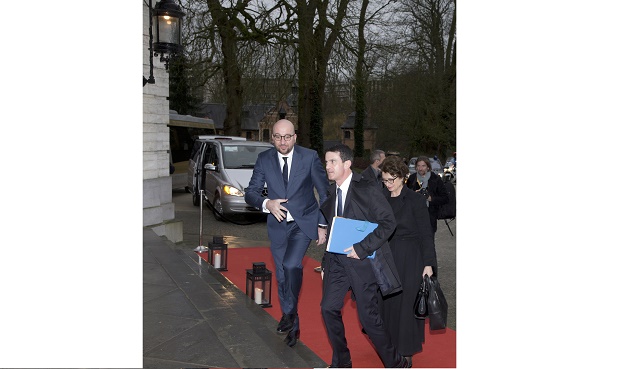Belgium, France agree to boost anti-terror cooperation

Belgian Prime Minister Charles Michel, left, speaks with French Prime Minister Manuel Valls as they arrive for a meeting to coordinate a response to violent extremism at Chateau Val Duchesse in Brussels on Monday, Feb. 1, 2016. AP Photo
BRUSSELS, Belgium—The Belgian and French prime ministers on Monday agreed on the need to boost counter-terror cooperation, after Belgium came under fire for failing to help prevent November’s Paris terror attacks.
Prime Minister Charles Michel of Belgium and French counterpart Manuel Valls were keen to present a united front following a row over alleged Belgian intelligence failings ahead of the jihadist attacks that killed 130 people in the French capital.
READ: More than 120 people killed in Paris ‘terror’ attacks
“The main message is that we stand side by side and are determined to work to increase the level of security for our citizens,” Michel told a joint press conference after the two leaders met in Brussels.
Valls added: “We must be united around our values, cooperate and become stronger against terrorism. I have never doubted the Belgian people.”
The premiers were joined by their interior and justice ministers, along with representatives of the military, police and intelligence services of both countries, and the magistrates leading the Paris attacks investigation.
A French official said the two countries were keen to boost intelligence-sharing, with the governments announcing that the French justice ministry would send a liaison official to Belgium on important cases.
READ: Belgium seeks 2 new ‘dangerous’ Paris attack suspects
Belgium has rejected French criticism of its police and intelligence services in the run-up to Paris attacks, which were claimed by the Islamic State of Iraq and Syria (ISIS) group.
After it emerged that some of the Paris attackers and alleged accomplices came from the troubled Brussels’ neighborhood of Molenbeek, Michel insisted: “Belgium is not a lawless area.”
Since mid-November, 11 people have been arrested and charged in Belgium in connection with the massacre. Key suspect Salah Abdeslam and his friend Mohamed Abrini—both from Molenbeek—are still at large.
On the wider EU front Valls called during the press conference for a “European security pact,” which he said was vital if Europe’s passport-free Schengen area is to survive the migration crisis rocking the continent.
He stressed the importance of sealing a deal to track and share airline passenger names as part of efforts to prevent a repeat of the Paris attacks, some of whose perpetrators travelled freely across Europe before the carnage.
Paris is pushing for a deal on sharing the names of airline passengers to help trace returning jihadists.
Both governments also backed plans by the European Commission to modify Schengen rules in order to “restore external border controls in a systematic and obligatory manner,” including for EU passport holders.